You can say that again!justin3am wrote: Get into DIY because you love building stuff, don't do it if you just want a cheaper path into modular synths.
justin3am's DIY eurorack adventure (complete!)
-
- KVRAF
- 15514 posts since 13 Oct, 2009
-
- KVRAF
- 5818 posts since 9 Jul, 2002 from Helsinki
Thanks for reply. Yeah, there's no instant gratification with any instrument, there's a learning curve before intuition and creative flow in a coherent, productive sense. I'm familiar and fine with that, which is also the reason I'm not an impulse buyer- I'm aware of the commitment and have only time for things that I'm convinced fit my style and add specific value to my setup.justin3am wrote:Yes, for me working with a hardware modular is different than working with almost any other kind of instrument. But it took me a while before I could call my modular an instrument. I think when you get started there are a lot of moments inspiration and happy accidents happening. Many of the people who start a modular system, don't get past that honeymoon period because it can take years to really learn the instrument. It can also take several years before you get to the point where the modular feels like an instrument. Lots of trial and error and experimenting with modules which may have little to no documentation. It can be very challenging but also very rewarding once everything starts falling into place.
Get into DIY because you love building stuff, don't do it if you just want a cheaper path into modular synths. Do it because you enjoy an adventure, don't do it if you are looking for a specific destination. If you treat it like a learning experience, you will have a lot of fun. If you treat a project as something that must be done in order to start making sound, you will likely find it very frustrating.
Oh I'll certainly get into synth DIY, the question is more about what specific devices! My procastrination about eurorack is more of a setup design/instrument choice, "cheap" and "modular" don't really fit in the same sentence anyway. I also think DIY modules or whole DIY systems don't command a high resell value, unlike trendy big-name modules, so there's no big cost savings when taking that into account.
My modulargrid planning seems to revolve around Erica Synths (I like the big, playable knobs and selection, check out their new Swamp, an enhanced Wogglebug!), Music Thing Modular and Ryo stuff, and the Toppobrillo Wavefolder would be fantastic. The main purpose would be drone/soundscape core to supplement my other instruments on ambient tracks. I'm pretty sure it would work, but then again I could get really similar results by routing a MicroGranny through an Evolver and adding something like Casper Electronics Nova Drone... and there's PreenFM2, a really lucrative linear FM poly project. And tons of more standalone projects.There are lots of great projects on the Thonk website, most are very well documented. Clicks & Clocks has you covered for building a rack and power distribution.
I wish I knew someone with a modular so I could actually test drive one and see how it feels.
- KVRAF
- Topic Starter
- 12352 posts since 7 May, 2006 from Southern California
I hope I didn't come across as discouraging... I've just gotten a lot of questions regarding the finance side of SDIY, so it's kind of a knee-jerk reaction. I've spent almost 10 years now, focused on SDIY and modular synths specifically and have come to find that it has changed the way I think about recording and producing in general. I now look at everything as part of a modular system and all equipment has the potential to be modified. Now that I have a stock pile of parts and tools, I'm more hesitant to purchase stuff that I could easily build.
However, when you work with a fixed architecture synth or effect, you will likely get sound out of it as soon as you turn it on. The experience of starting with an unpatched synth at the beginning of each project is kind of daunting and kind of addicting at the same time. To go even further, if you start a project with an idea for a device that isn't even assembled yet, it's an incredible feeling once you are actually able to make sound with that device. You will develop an attachment and familiarity that you may not get from anything else you use. Even if that device is not capable of much you'll feel a drive to get everything you can from it.
I remember a time when I was concerned that if I got too deep into building stuff in Reaktor, that I would lose focus on music. That didn't happen but it sure changed the way I think about music.
Anyway I don't have any experience with the Erica kits but I used one of their systems at Perfect Circuit Audio and it's quite impressive. I understand the kits are pretty easy to get started with. I don't have any experience with RYO either. The TWF is a bit of a challenge. The PCB is super dense and I'm not sure if it's available as a kit (I just got the PCB and panel, then sourced my own parts). Still it's one of my all time favorite modules. Maybe wait until you have a few kits under your belt before starting on projects where you need to source parts or do any kind of wiring from the PCB to front panel controls. Seriously, sourcing parts is one of the most frustrating things for me... and it's part of my day job!
However, when you work with a fixed architecture synth or effect, you will likely get sound out of it as soon as you turn it on. The experience of starting with an unpatched synth at the beginning of each project is kind of daunting and kind of addicting at the same time. To go even further, if you start a project with an idea for a device that isn't even assembled yet, it's an incredible feeling once you are actually able to make sound with that device. You will develop an attachment and familiarity that you may not get from anything else you use. Even if that device is not capable of much you'll feel a drive to get everything you can from it.
I remember a time when I was concerned that if I got too deep into building stuff in Reaktor, that I would lose focus on music. That didn't happen but it sure changed the way I think about music.
Anyway I don't have any experience with the Erica kits but I used one of their systems at Perfect Circuit Audio and it's quite impressive. I understand the kits are pretty easy to get started with. I don't have any experience with RYO either. The TWF is a bit of a challenge. The PCB is super dense and I'm not sure if it's available as a kit (I just got the PCB and panel, then sourced my own parts). Still it's one of my all time favorite modules. Maybe wait until you have a few kits under your belt before starting on projects where you need to source parts or do any kind of wiring from the PCB to front panel controls. Seriously, sourcing parts is one of the most frustrating things for me... and it's part of my day job!
-
- KVRAF
- 15514 posts since 13 Oct, 2009
Size is one of the reasons that I don't like Eurorack. A number of years ago when I built my small DIY modular (I'm talking about 2009ish) it wasn't quite as dominant as it is today. I largely went Frac Rack at the time because of the low cost of pure DIY. I can't say that I'm happy with that choice, however, there is still so much that I find annoying about Eurorack. On the upside, it's really not that hard to combine formats so I keep contemplating building a couple of Eurorack frames to add to my existing gear..jon wrote: My modulargrid planning seems to revolve around Erica Synths (I like the big, playable knobs and selection, check out their new Swamp, an enhanced Wogglebug!), Music Thing Modular and Ryo stuff, and the Toppobrillo Wavefolder would be fantastic.
But, I don't want to digress too much here. For me, the frustration with format and simultaneous discovery of Reaktor led me in different directions and I think that thinking about how you want to work, and what kind of work you like to do isn't something to ignore.
So, while I agree with some of justin's POV, I would also caution that I think that the "thrill of DIY" for it's own sake doesn't always linger in the same way for everyone. I've been building stuff that makes either noise or radio waves since I was a kid, and that was more than a few decades ago. So, sure, I still build stuff, and I still enjoy it, but I honestly don't get that much out of kit building. I have done it, often to save a few bucks, but it can be as tedious, and as zen, as washing dishes for me. It's not the same for me, AT ALL, as designing and building something of my own and I get almost as much joy out of doing that in environments like Reaktor as a I do with a soldering iron.
However, that said, I think that there absolutely is something to using modular analog hardware. I'm being specific here for a reason. It's not that I don't think that digital modules aren't great, they absolutely are, it's that if you're not using them with at least some analog electronics, I don't think that they're much greater than just using dsp+controllers.
For me though, it's more about how having your hands on cables and knobs and the real time experimentation in, what amounts to practically, largely non-reversible ways, as just fun to work with. I don't get exactly the same kind of experience with software modular environments.
At any rate, I could drone on for pages, but mostly I'm trying to be helpful in this conversation so I'll say a few things and then let the conversation develop further.
I don't get the point of projects like microgranny or preenfm2 unless you are bringing them into a live rig. Surely anything that they can do can be done with Reaktor? The entire point of building in the context of a modular rig is that a modular expands the your abilities to connect things in complex and often difficult to imagine ways.The main purpose would be drone/soundscape core to supplement my other instruments on ambient tracks. I'm pretty sure it would work, but then again I could get really similar results by routing a MicroGranny through an Evolver and adding something like Casper Electronics Nova Drone... and there's PreenFM2, a really lucrative linear FM poly project. And tons of more standalone projects.
I'm not saying that I don't think that standalone projects can be cool, or even just fun, I do think that it's easy to let the DIY aspect of those kinds of projects become a distraction. Particularly since there is very little to them from an interesting electronics POV. Essentially, it's a computer in a little box.
So, for me, this is where I wouldn't bother with building unless it somehow became a part of something that I envisioned in a performance or could be adapted to a project with more depth. I'm not saying that it isn't a useful instrument or can't achieve interesting results, I'm saying that I would get roughly the same amount of satisfaction of building it that I get from a assembling a set of too complicated for its own good ikea furniture.
One thing to really know about DIY is that it is VERY time consuming. So, if you view your time as valuable in any way it matters that you optimize it in a way that matters for you.
If you shop well you can probably essentially rent a eurorack modular for not too much money and try it out. By that I mean that you could buy a small modular and play with it for a few months and then sell it along if it doesn't work for you.I wish I knew someone with a modular so I could actually test drive one and see how it feels.
I could make an entire album with a MakeNoise 0-coast and my DAW. I'm not promising that anyone other than me would want to listen to it, but I could make the album.
At any rate, I'm not trying to be discouraging either. I think that building with electronics, and in software, can be extremely rewarding, but I also think that the shiny of that can wear off and what's left is whether or not you get something more out of building gear than you would just buying it. That's where I focus my building efforts these days. What can I build that would either be impractical in some way or impossible to buy? I don't waste my time trying to better Diva in Reaktor, for example, but building complex FM/hybrid synths is interesting.
Similarly, building small standalone electronic things or new modules, or even new racks of modules is something that I still pursue, but I don't view DIY as some holy grail. I would purchase modules used if that's what I wanted exactly and it was cheaper than building. Part of what I'm saying is that I think that pursuing an interest in electronics is much more interesting in and of itself than just building things.
At any rate, I've talked too much already for one post.
Last edited by ghettosynth on Thu Sep 14, 2017 5:25 am, edited 1 time in total.
- KVRAF
- Topic Starter
- 12352 posts since 7 May, 2006 from Southern California
Great post! 
I'm glad I'm not the only one sharing a perspective on the subject. My experience may be slightly different from ghettosynth but he makes a lot of great points. Especially what he says about the value of your time. Anytime you are building or troubleshooting, you aren't making music or anything else which could be a "more valuable" use of that time.
I don't know about anyone else but the troubleshooting thing really gets me sometimes. If something in my studio is not working as it should, I can't work on music until it's fixed. It's like a mental block. Even if I don't plan on using a specific thing in a project, I can carry on until it's fixed.
I also think that now is a great time to get into modular because there is little financial risk, especially if you buy stuff on the used market. If you buy a module used you can often resell it for the same price you paid for it and there is demand for even less popular modules.
When I started writing this thread (and the Ambika thread, before), it was because a lot of the information I needed was scattered all over the web and in books that are now hard to find. I didn't know where to start and had to ask a lot of embarrassing questions to get where I am now. I'm not writing from the perspective of an expert but as an enthusiastic novice. I learned so much along the way, that I wanted to provide a resource for others who are getting started in the same way.
My ultimate hope is for someone who was inspired by my experience, to build something and then share their experience.
I'm glad I'm not the only one sharing a perspective on the subject. My experience may be slightly different from ghettosynth but he makes a lot of great points. Especially what he says about the value of your time. Anytime you are building or troubleshooting, you aren't making music or anything else which could be a "more valuable" use of that time.
I don't know about anyone else but the troubleshooting thing really gets me sometimes. If something in my studio is not working as it should, I can't work on music until it's fixed. It's like a mental block. Even if I don't plan on using a specific thing in a project, I can carry on until it's fixed.
I also think that now is a great time to get into modular because there is little financial risk, especially if you buy stuff on the used market. If you buy a module used you can often resell it for the same price you paid for it and there is demand for even less popular modules.
When I started writing this thread (and the Ambika thread, before), it was because a lot of the information I needed was scattered all over the web and in books that are now hard to find. I didn't know where to start and had to ask a lot of embarrassing questions to get where I am now. I'm not writing from the perspective of an expert but as an enthusiastic novice. I learned so much along the way, that I wanted to provide a resource for others who are getting started in the same way.
My ultimate hope is for someone who was inspired by my experience, to build something and then share their experience.
- KVRAF
- Topic Starter
- 12352 posts since 7 May, 2006 from Southern California
On an unrelated note...
I had thought about writing an epilogue about DIY PSUs and power distribution. But there is a lot that can be done wrong and if you are dealing with mains voltage (which I am), it can be really dangerous. I just wasn't confident enough in my knowledge, if you know what I mean.
There are now some great DIY power solutions...
The Case Power uses an off the shelf switching PSU, so there is no messing with high voltage.
The L-1 Eurorack Power system, is a linear PSU based on a toroidal transformer. This is more geared toward experienced builders.
Not new but I just recently built a power supply +/-15 PSU based on Ken Stone's schematic. You can build it with 7812 and 7912 voltage regulators for +/-12v operation. He suggests using a center-tapped transformer, but I'm using a 18v AC wall wart, without any problems.
For the project I documented in this thread, I started with a PowerOne HBB15-1.5A, with Tip Top power distribution. But I've since built my own distro boards, so I could use the Tip Top ones in another case. These PowerOne supplies are my favorite. I have two of the HBBs and 3 HCC15-3a units, for my main modular systems. Don't buy them new. They go for peanuts on the second hand market and they last forever. Again, these are linear supplies and require a 110v-240v AC input.
I had thought about writing an epilogue about DIY PSUs and power distribution. But there is a lot that can be done wrong and if you are dealing with mains voltage (which I am), it can be really dangerous. I just wasn't confident enough in my knowledge, if you know what I mean.
There are now some great DIY power solutions...
The Case Power uses an off the shelf switching PSU, so there is no messing with high voltage.
The L-1 Eurorack Power system, is a linear PSU based on a toroidal transformer. This is more geared toward experienced builders.
Not new but I just recently built a power supply +/-15 PSU based on Ken Stone's schematic. You can build it with 7812 and 7912 voltage regulators for +/-12v operation. He suggests using a center-tapped transformer, but I'm using a 18v AC wall wart, without any problems.
For the project I documented in this thread, I started with a PowerOne HBB15-1.5A, with Tip Top power distribution. But I've since built my own distro boards, so I could use the Tip Top ones in another case. These PowerOne supplies are my favorite. I have two of the HBBs and 3 HCC15-3a units, for my main modular systems. Don't buy them new. They go for peanuts on the second hand market and they last forever. Again, these are linear supplies and require a 110v-240v AC input.
-
- KVRAF
- 5818 posts since 9 Jul, 2002 from Helsinki
I'm very thankful to both of you for your insights, really gave me a lot to think about. Unfortunately I'm stupid busy for a few days now with non-music real life stuff, but I'll let this all sink in a bit once I recover.
-
- KVRAF
- 5818 posts since 9 Jul, 2002 from Helsinki
It took a while and around 6-7 long modulargrid sessions, but I've finally concluded I can't get a useful, compact modular out of the DIY modules suitable for my skill level or gear (ie. full kits, no surface mount components or extensive calibration). It would take a lot of resources to get even close to my Evolver, but I'd like to avoid duplication of instruments/features so digital modules like Rings, Clouds and Morphagene are what interest me in eurorack. Unfortunately I don't think I'm up to DIYing the MI stuff.
I'll get the Microgranny, some pedal kits and consider a Lyra-8 when my skills develop more. There's more case crafting in standalone stuff, which I find very interesting. I'm building a 10-string kantele on a course, and hope to apply the woodworking skills from that project into electronic instruments as well.
I'll get the Microgranny, some pedal kits and consider a Lyra-8 when my skills develop more. There's more case crafting in standalone stuff, which I find very interesting. I'm building a 10-string kantele on a course, and hope to apply the woodworking skills from that project into electronic instruments as well.
- KVRAF
- Topic Starter
- 12352 posts since 7 May, 2006 from Southern California
I can understand that. If you were mostly focused on analog stuff, you could build a whole synth with CGS and MFOS stuff. All through-hole and largely available in kit form (SynthCube carries MFOS, Elby carries CGS stuff). However, most digital module projects are SMT and you have to source your own parts (not to mention flashing/programming the micro). It's not unattainable, but it requires a different set of skills and a different set of tools.
I hope you have fun with your DIY projects and I encourage you to share your experience with us.
I hope you have fun with your DIY projects and I encourage you to share your experience with us.
- KVRAF
- 6095 posts since 5 Jul, 2001 from Just about .... there
Although I am MU/5U instead of Euro, a lot of the same issues as described by justin3am apply.
1) Modular synthesis itself is not easy or for everyone. Especially these days with presets and quality In the box options.
2) DIY is not actually "cheaper". It can be expensive to get completely into end to end creation. And, without doing end-2-end, you can actually spend more on things like panels and power than you would if you just bought an item.
3) There is an absolute time commitment to DIY. You have to enjoy that time for it to be worthwhile. I enjoy putting together circuits and seeing how all the little subsets actually work. Wiring sucks. I hate wiring. And, I can't stand wiring. Not only that, wiring sucks. But, I put up with it because I like all the rest.
4) With DIY you have to be prepared to fail!! I can't stress enough how important it is to realize that you will end up with things that don't work "correctly". It took me three or four times as long to troubleshoot and fix my SOU build than it did to build it in the first place. I have a mini-sequencer where the 4th stage does not trigger. I simply can't figure out why not. It's skip and return functions work, but the trigger does not fire. I've changed my mind several times on how to do the summing on my low pass gate project (justin3am even gave me some ideas). So although it works, I've unsoldered major portions three times now (and unwired ... which means I have to rewire ).
).
Once you get past some of these downsides, I think DIY is awesome. It just isn't for everyone, and there are misconceptions about "price".
1) Modular synthesis itself is not easy or for everyone. Especially these days with presets and quality In the box options.
2) DIY is not actually "cheaper". It can be expensive to get completely into end to end creation. And, without doing end-2-end, you can actually spend more on things like panels and power than you would if you just bought an item.
3) There is an absolute time commitment to DIY. You have to enjoy that time for it to be worthwhile. I enjoy putting together circuits and seeing how all the little subsets actually work. Wiring sucks. I hate wiring. And, I can't stand wiring. Not only that, wiring sucks. But, I put up with it because I like all the rest.
4) With DIY you have to be prepared to fail!! I can't stress enough how important it is to realize that you will end up with things that don't work "correctly". It took me three or four times as long to troubleshoot and fix my SOU build than it did to build it in the first place. I have a mini-sequencer where the 4th stage does not trigger. I simply can't figure out why not. It's skip and return functions work, but the trigger does not fire. I've changed my mind several times on how to do the summing on my low pass gate project (justin3am even gave me some ideas). So although it works, I've unsoldered major portions three times now (and unwired ... which means I have to rewire
Once you get past some of these downsides, I think DIY is awesome. It just isn't for everyone, and there are misconceptions about "price".
If you have to ask, you can't afford the answer
- KVRAF
- Topic Starter
- 12352 posts since 7 May, 2006 from Southern California
I must have brain worms because I decide it would be a good idea to convert some of my DIY eurorack modules to banana jacks, to make them easier to use with my Serge modular.

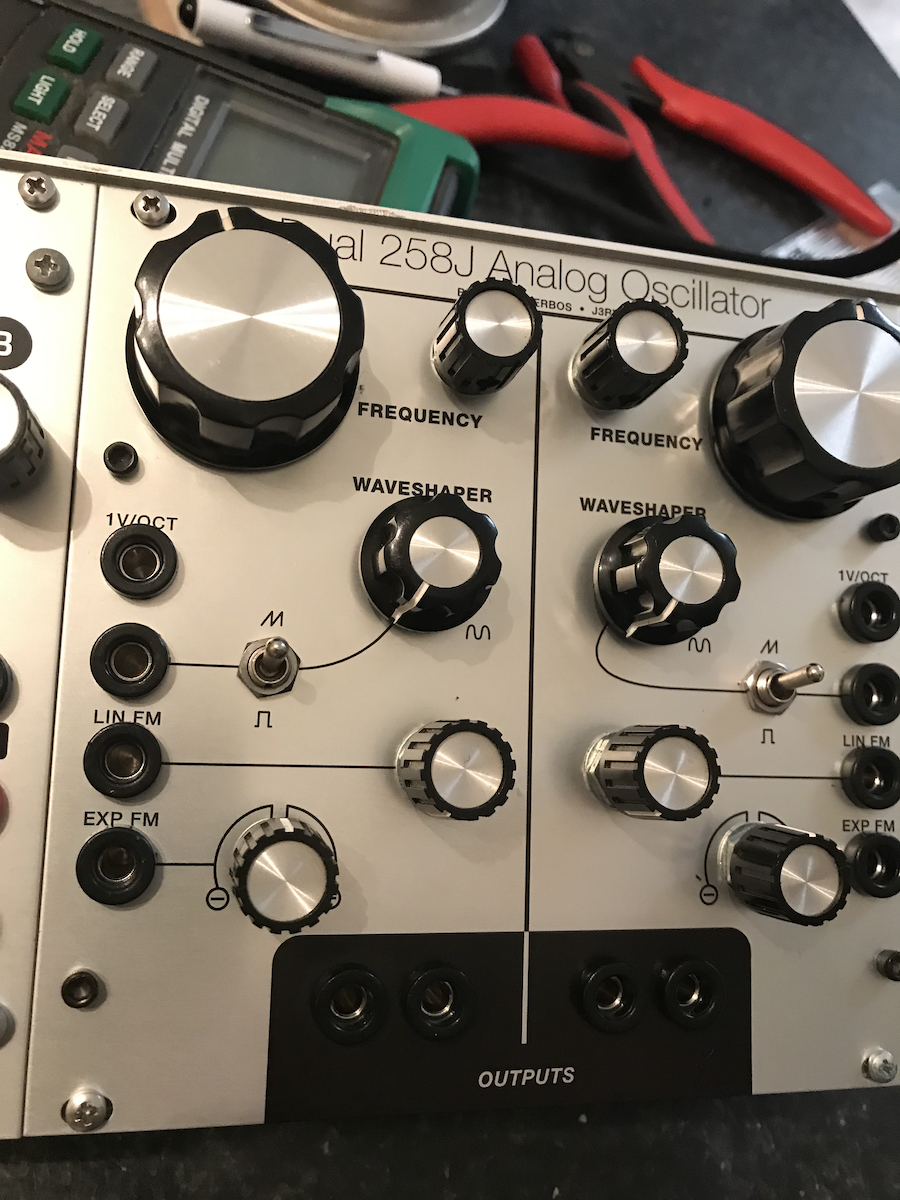
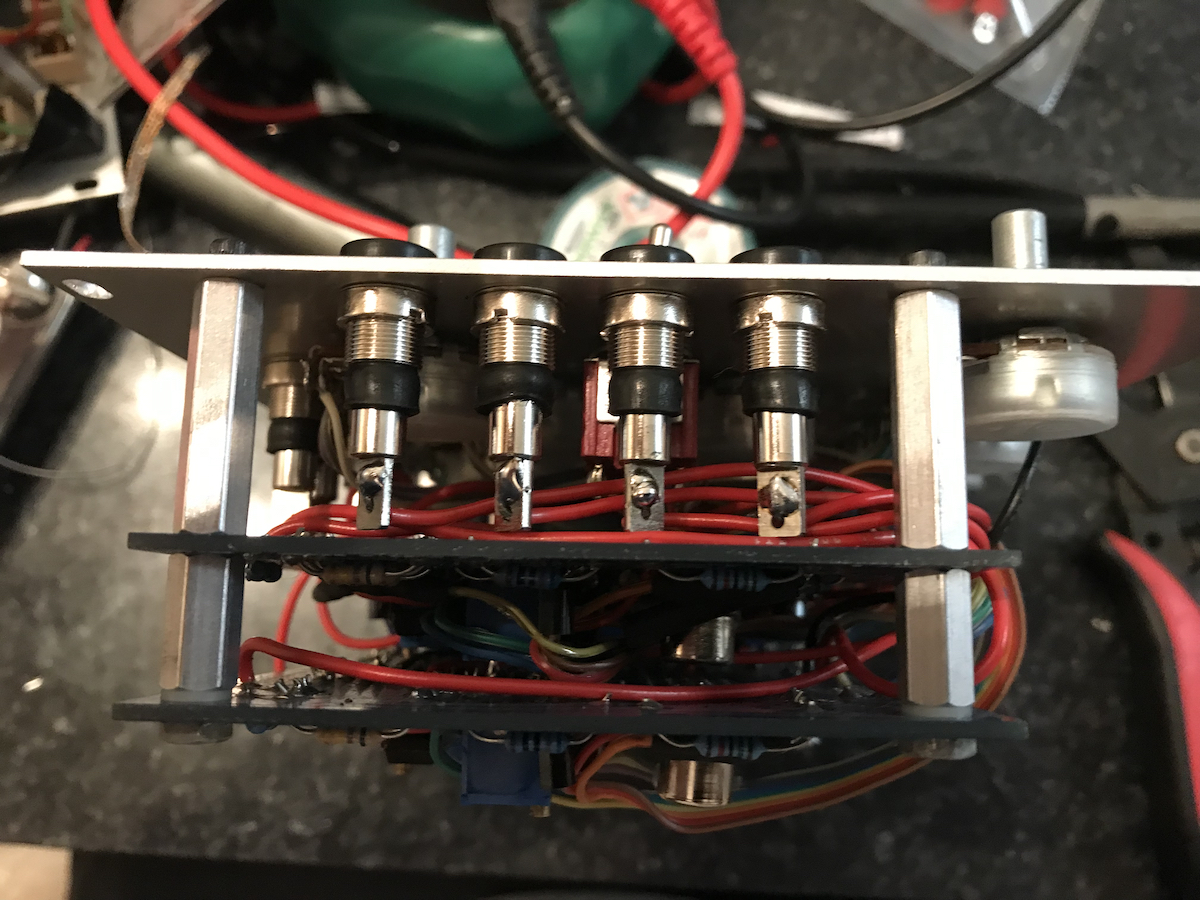
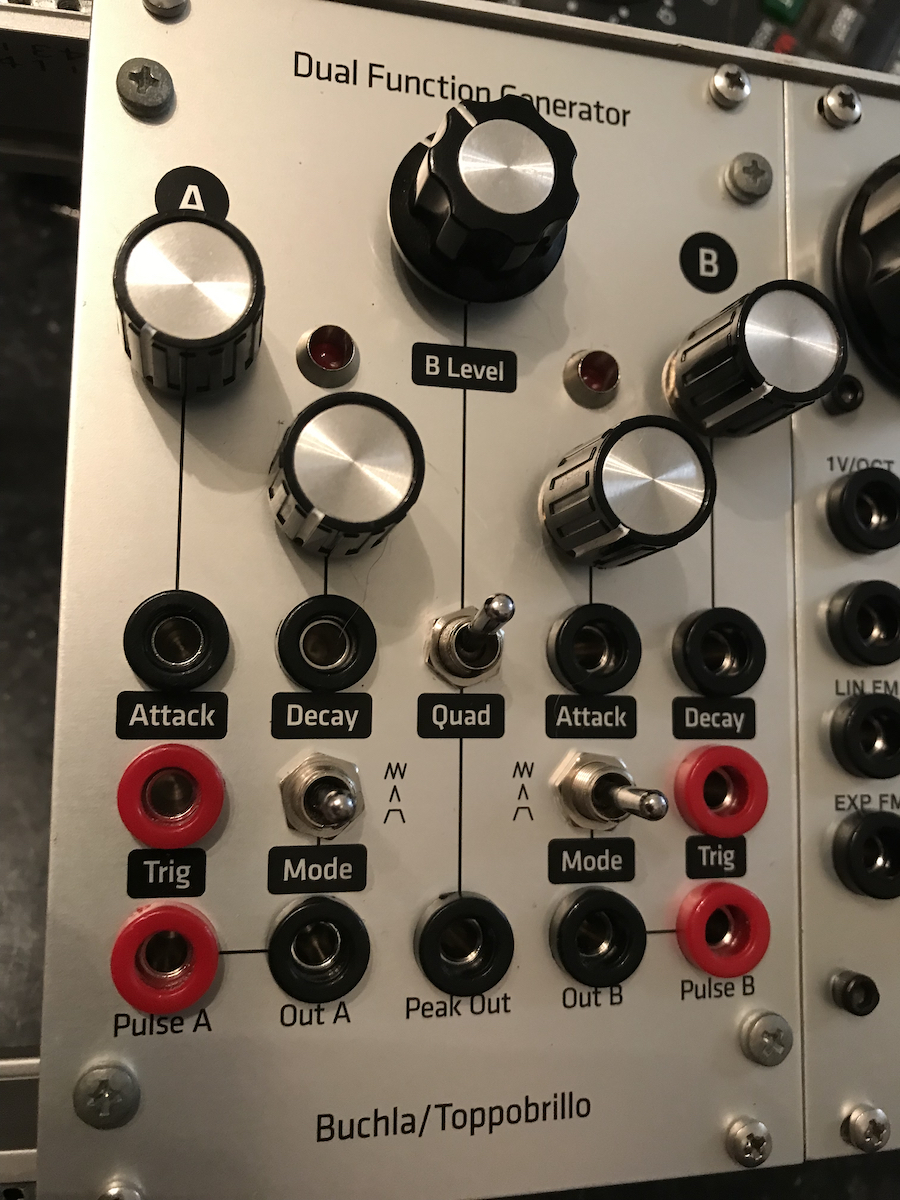
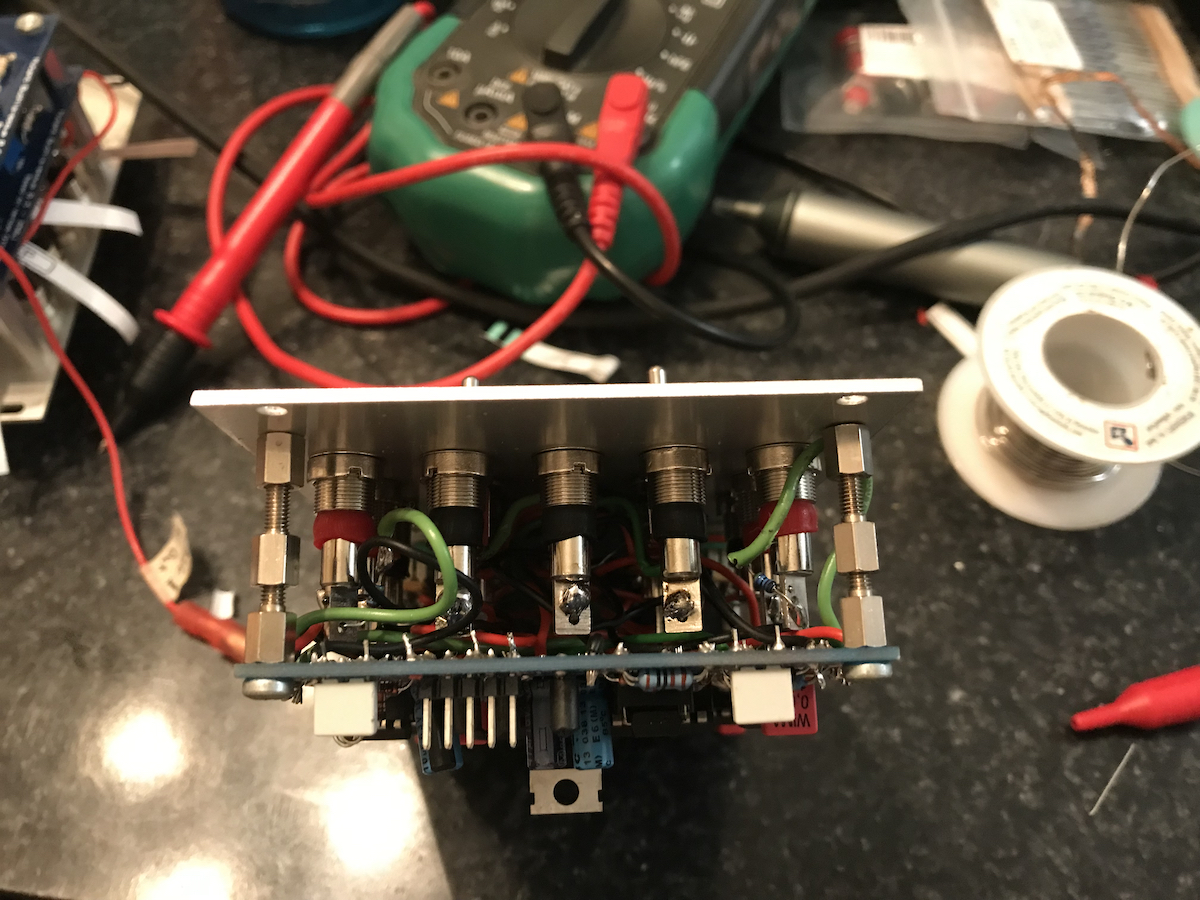
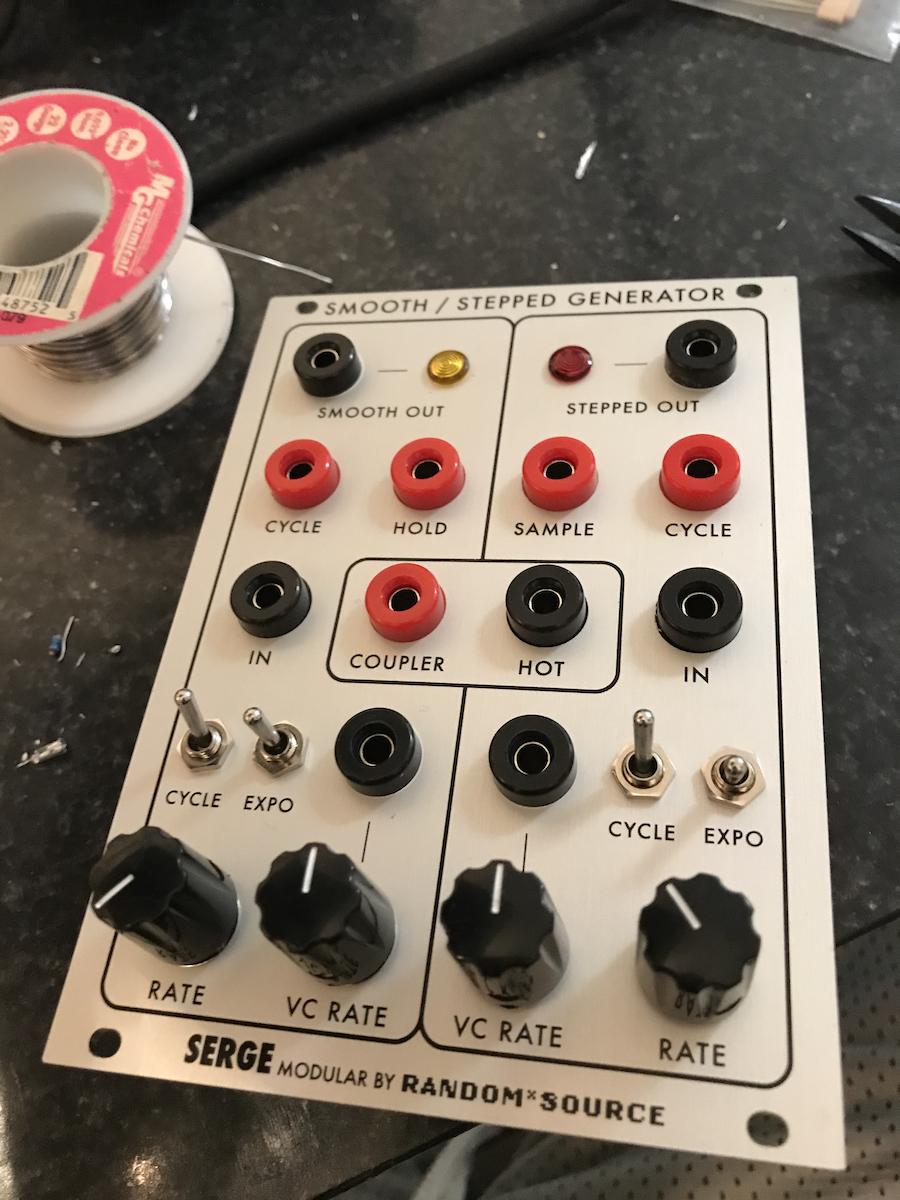
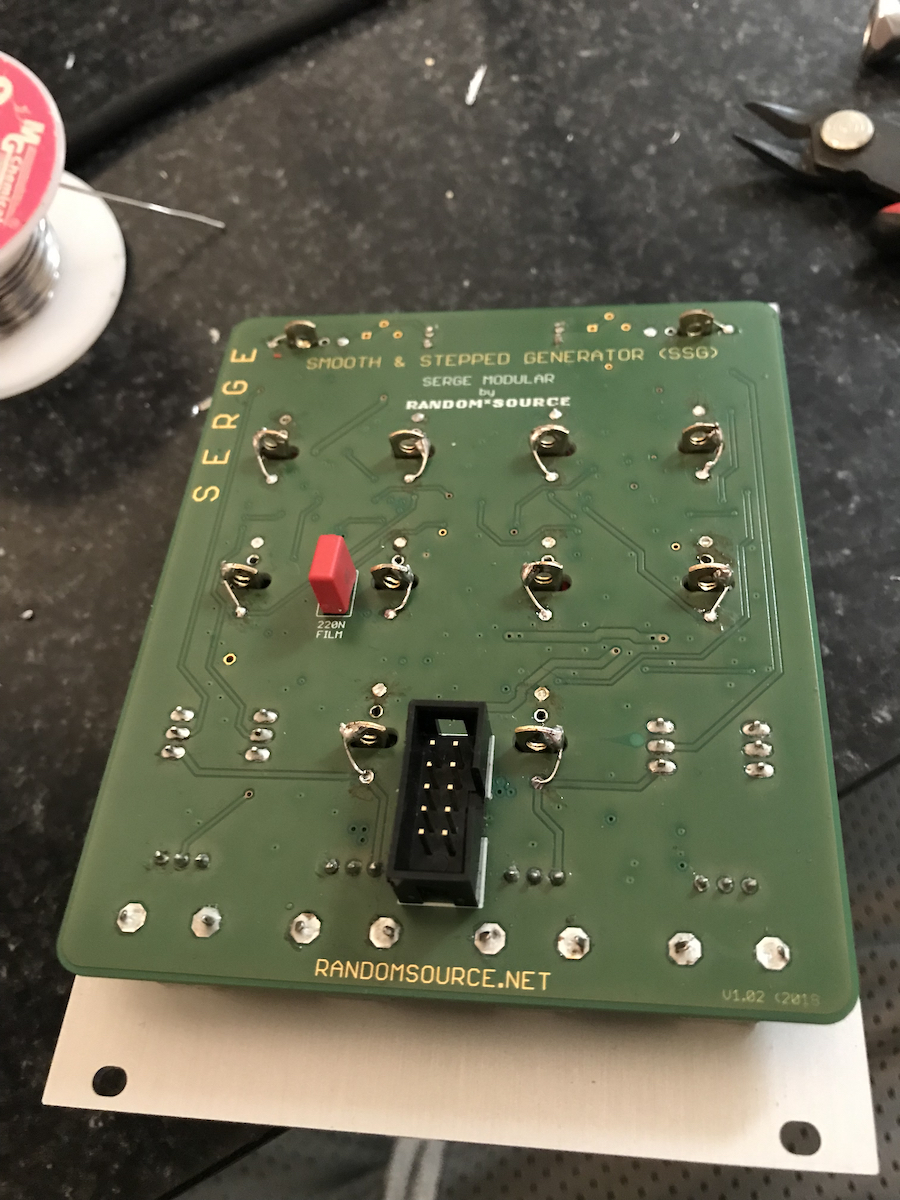
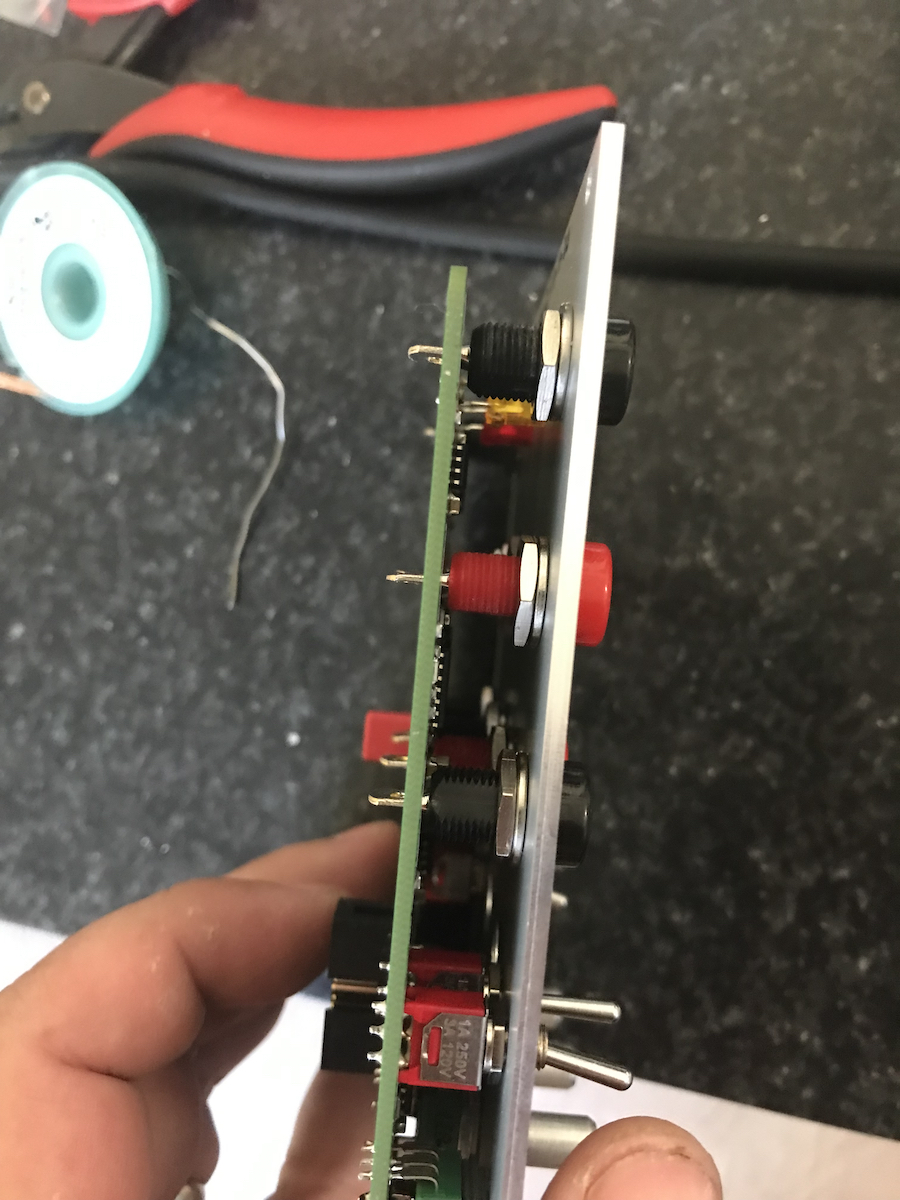
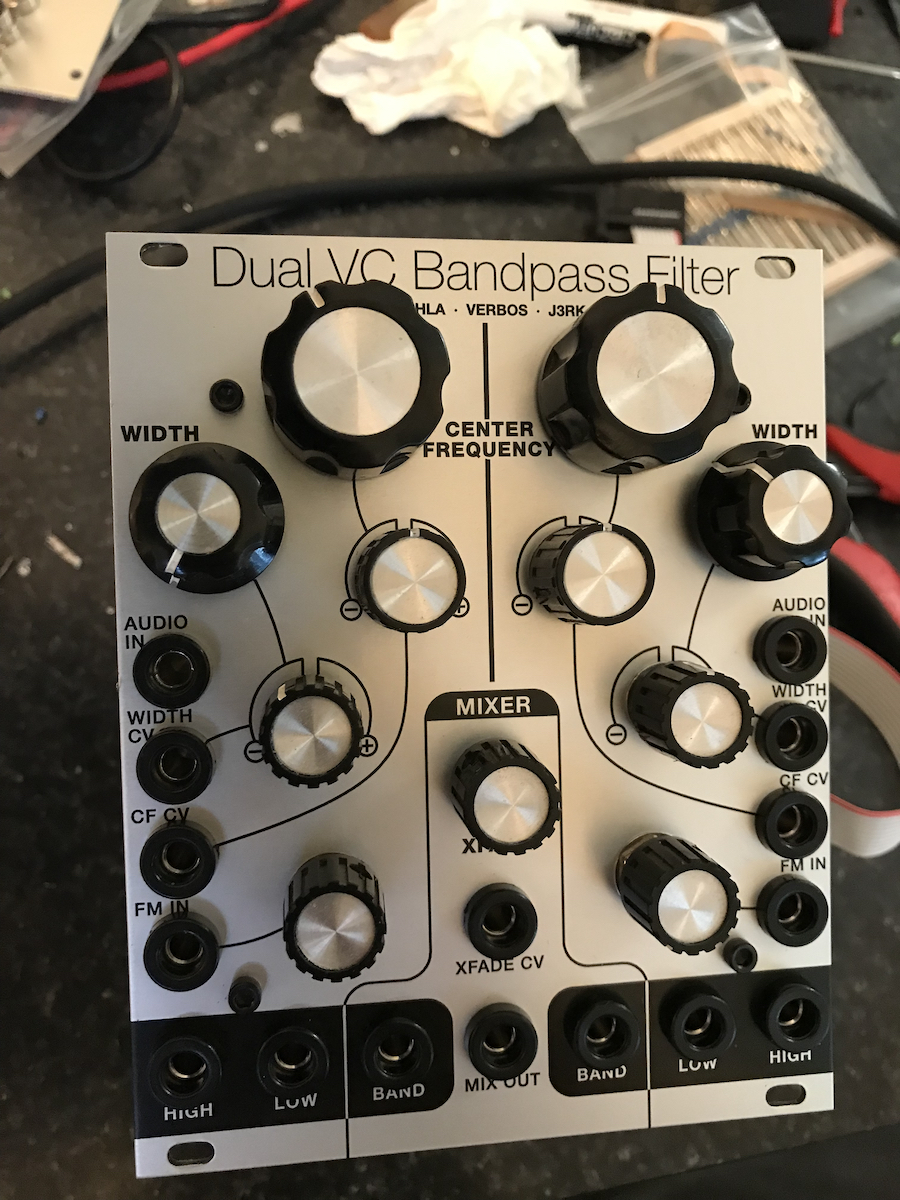
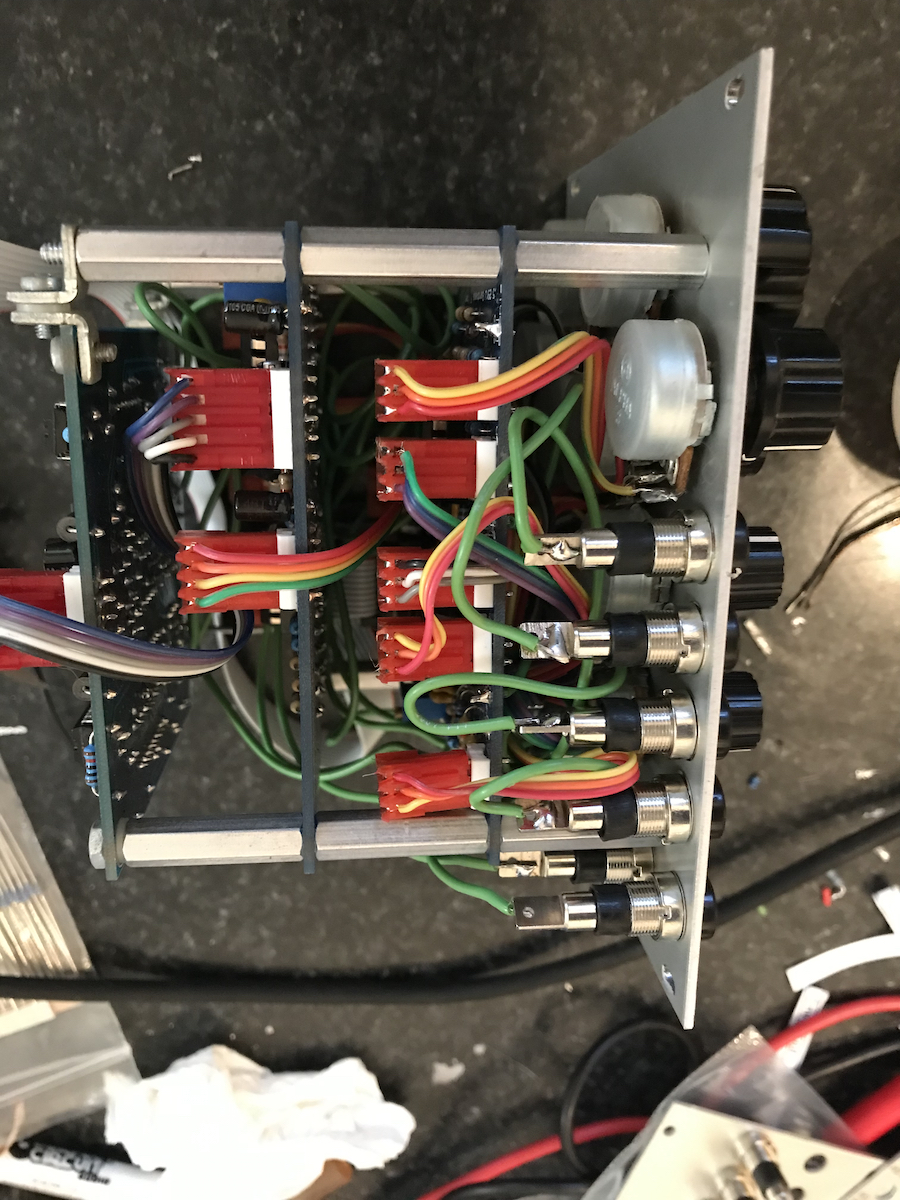
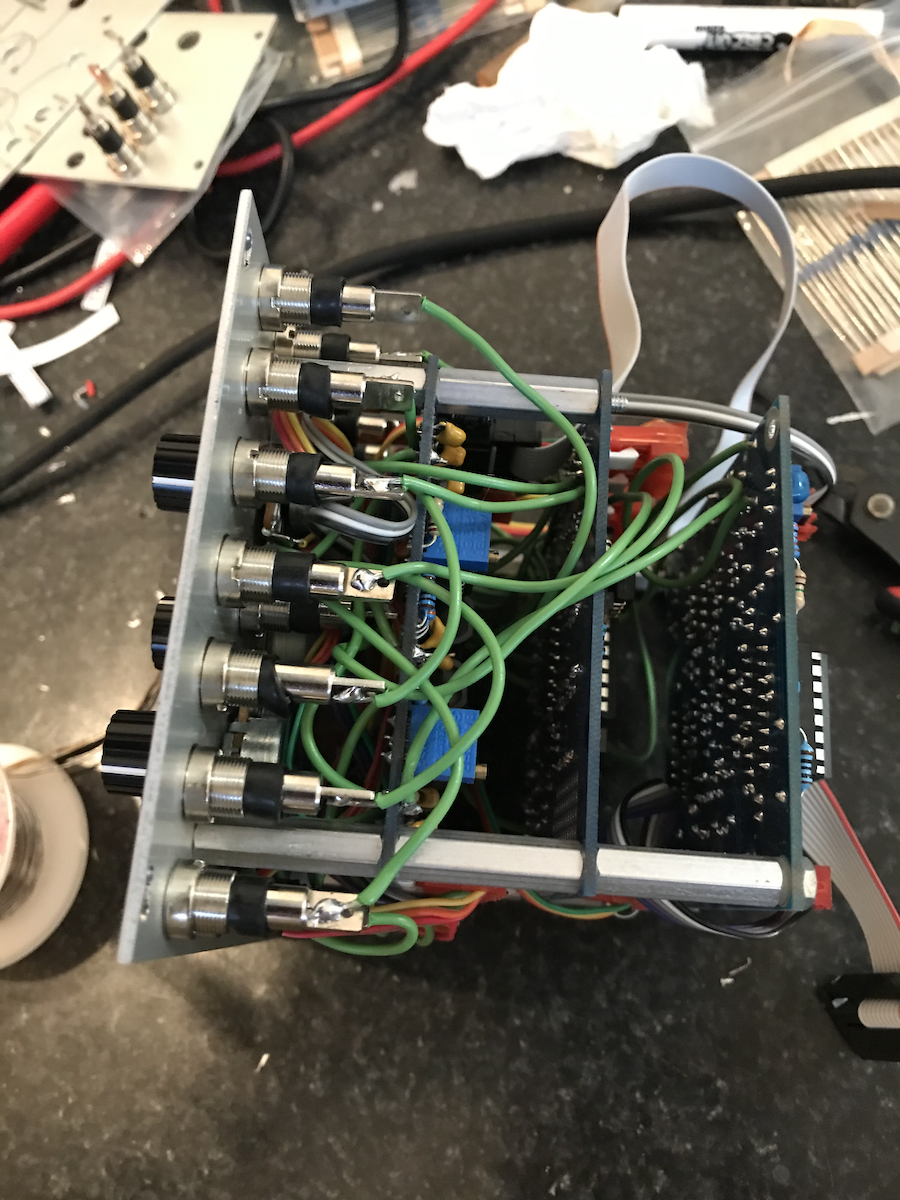
These were actually really easy. Some the other modules I plan to convert will be more challenging but so far it's been fun.











These were actually really easy. Some the other modules I plan to convert will be more challenging but so far it's been fun.
- KVRAF
- Topic Starter
- 12352 posts since 7 May, 2006 from Southern California
That's right. All of these modules were originally normalled together, so that the synth had a fixed "default" patch but none of those connections were part of the original circuit, so it's not a big deal. Only one or two of my DIY modules have normalled connections as part of the circuit. Luckily with those (Barton VCA/Mixer, Toppobrillo Triple Wavefolder, there is enough panel space available to add SPDT switches.
Depending on how this goes, I may also convert a few commercial modules.
I ran the NTO from my Serge synth through the 291j, using the SSG, Toppobrillo 281 and 258j for modulation and here is the result: https://soundcloud.com/justin3am/sergenoodle-01
- KVRAF
- Topic Starter
- 12352 posts since 7 May, 2006 from Southern California
Thanks! Yeah, I'm constantly finding excuses to burn the f**k out of my fingers. Helps to build calluses for guitar playing.












